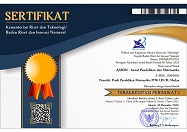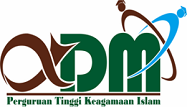PERSPEKTIF GURU PADA DIMENSI PENGUKURAN DAN PENILAIAN DALAM PEMBELAJARAN MATEMATIKA
Abstract
Matematika merupakan mata pelajaran yang diajarkan dalam penerapan kurikulum 2013. Implementasi kurikulum 2013 menuntut guru lebih professional dan produktif dalam melaksanakan kegiatan pembelajaran. Untuk itu, guru harus memahami subjek pembelajaran yang ingin diajarkan dan mengerti strategi pembelajaran baik dalam hal pengukuran maupun penilaian. Penelitian ini merupakan penelitian kualitatif dengan pendekatan fenomenologis. Partisipan penelitian terdiri dari 40 guru matematika dengan pengalaman mengajar lebih dari 5 tahun yang berasal dari 7 kota di Indonesia. Teknik pengumpulan data dilakukan dengan wawancara terstruktur dan FGD. Analisis data menggunakan model Bogdan & Biglen dan statistik deskriptif untuk menganalisis informasi yang diperoleh. Analisis ini bertujuan untuk memperoleh informasi mengenai 4 sub-tema yaitu pemahaman guru mengenai arti matematika, tujuan mengajarkan matematika, dimensi yang diukur pada pembelajaran matematika, dan mengukur dan menilai matematika. Hasil penelitian menunjukkan bahwa guru memahami arti matematika, tujuan mengajarkan matematika, dan mengetahui dimensi yang diukur dalam pembelajaran matematika namun sulit menentukan teknik atau metode yang tepat dalam mengukur dan menilai kemampuan matematika siswa. Fakta lain diperoleh bahwa guru merasa kesulitan dalam melaksanakan pembelajaran berdasarkan sistem pendidikan yang diterapkan saat ini khususnya dalam hal pengukuran dan penilaian.
Abstract
Mathematics is a subject taught in the implementation of the 2013 curriculum. Implementation of the 2013 curriculum requires teachers to be more professional and productive in carrying out learning activities. For this reason, teachers must understand the learning subjects they want to teach and understand learning strategies both in terms of measurement and assessment. This research follows qualitative research with a phenomenological approach. The research participants consisted of 40 math teachers with more than 5 years of teaching experience from 7 cities in Indonesia. Data collection techniques were carried out using structured interviews and FGD. The data were analyzed by using the Bogdan & Biglen model and descriptive statistics to analyze the information obtained. This analysis aims to obtain information about 4 sub-themes, namely the teacher's understanding of the meaning of mathematics, the purpose of teaching mathematics, dimensions measured in learning mathematics, and measuring and assessing students' mathematical abilities. The results of the study show that teachers understand the meaning of mathematics, and the purpose of teaching mathematics, and know the dimensions measured in learning mathematics, but it is difficult to determine the appropriate technique or method for measuring and assessing students' mathematical abilities. In addition, another fact is that teachers find it difficult to carry out learning based on the currently implemented education system, especially in terms of measurement and assessment.
Keywords
Full Text:
PDF (Indonesian)References
Abidin, Y. (2012). Model penilaian otentik dalam pembelajaran membaca pemahaman beroreintasi pendidikan karakter. Jurnal Pendidikan Karakter, 3(2). 164-178. https://doi.org/10.21831/jpk.v0i2.1301
Abidin, Z., Hudaya, A., & Anjani, D. (2020). Efektivitas pembelajaran jarak jauh pada masa pandemi Covid-19. Research and Development Journal of Education, 1(1). 131-146. https://doi.org/10.30998/rdje.v1i1.7659
Aiken, L.R. (1979). Attitudes toward mathematics and science in Iranian middle schools. . . School Science and Mathematics, 79(3), 229-234.
Anthony, G., & Walshaw, M. (2007). Effective pedagogy in mathematics/paÌ" ngarau: Best evidence synthesis iteration (BES). Ministry of Education.
Aulia, R. N., Rahmawati, R., & Permana, D. (2020). Peranan penting evaluasi pembelajaran bahasa di sekolah dasar. Jurnal BELAINDIKA (Pembelajaran dan Inovasi Pendidikan), 2(1). 1-9. https://belaindika.nusaputra.ac.id/article/view/22
Avargil, S., Herscovitz, O., & Dori, Y.J. (2012). Teaching thinking skills in context-based learning: Teachers' challenges and assessment knowledge. Journal of Science Education and Technology, 21(2). 207-225. https://doi.org/10.1007/s10956-011-9302-7
Ball, D.L. (1993). With an eye on the mathematical horizon: Dilemmas of teaching elementary school mathematics. The Elementary School Journal, 93(4). 373-397. https://www.journals.uchicago.edu/doi/abs/10.1086/461730
Ball, D.L., Hill, H.C., & Bass, H. (2005). Knowing mathematics for teaching. American Educator, Fall. 14-22. https://doi.org/10.1016/j.cedpsych.2006.02.001
Barnes, A., & Marks, R. (2020). Formative assessment in mathematics education. Debates in Mathematics Education. https://doi.org/10.4324/9780429021015-19
Bottge, B.A., Rueda, E., Serlin, R.C., Hung, Y.H., & Kwon, J.M. (2007). Shrinking achievement differences with anchored math problems: Challenges and possibilities. Journal of Special Education, 41(1), 31-49. https://doi.org/10.1177/00224669070410010301
Burton, C.E., Anderson, D.H., Prater, M.A., & Dyches, T.T. (2013). Video self-modeling on an ipad to teach functional math skills to adolescents with autism and intellectual disability. Focus on Autism and other Developmental Disabilities, 28(2), 67-77. https://doi.org/10.1177/1088357613478829
Chukwuyenum, A.N. (2013). Impact of critical thinking on performance in mathematics among senior secondary school students in Lagos State. IOSR Journal of Research & Method in Education (IOSRJRME), 3(5), 18-25. https://doi.org/10.9790/7388-0351825
Conklin, W. (2012). Higher order thinking skills to develop 21st century learners. Shell Education. https://bit.ly/3Pr4WhF
Cooney, T.J., & Wiegel, H.G. (2003). Examining the mathematics in mathematics teacher education. Second International Handbook of Mathematics Education, 795-828. https://doi.org/10.1007/978-94-010-0273-8_26
Egereonu, R.A.C. (2010). Analysis of psychomotor domain as a relevant factor in the understanding of mathematical concepts. 19(1), 1-5. https://bit.ly/3NK6Bg7
Ferreira, M., Martinsone, B., & Talić, S. (2020). Promoting sustainable social emotional learning at school through relationship-centered learning environment, teaching methods and formative assessment. Journal of Teacher Education for Sustainability, 22(1), 21-36. https://doi.org/10.2478/jtes-2020-0003
Garnett, K. (1998). Math learning disabilities. https://bit.ly/3r6qOET
Gowers, T. (2002). The importance of mathematics. Springer. https://bit.ly/44fymDz
Grootenboer, P., Gregor, L., & Naomi, I. (2008). The affective domain and mathematics education. In Research in mathematics education in Australasia 2004-2007. Brill. https://doi.org/10.1163/9789087905019_013
Han, S., & Daniel, C. (2014). Construct validation of student attitude toward science, technology, engineering and mathematics project-based learning: The case of Korean middle grade students. Middle Grades Research Journal, 9(3). 27-41. https://bit.ly/3Pw11Aq
Herzig, A. H. (2005). Connecting research to teaching: Goals for achieving diversity in mathematics classrooms. The Mathematics Teacher, 99(4). 253-259. https://doi.org/https://doi.org/10.5951/MT.99.4.0253
Jailani, & Retnawati, H. (2016). The challenges of junior high school mathematic teachers in implementing the problem-based learning for improving the higher-order thinking skills. The Online Journal of Counseling and Education, 5(3), 1-13. https://bit.ly/46nngOP
Kaufman, J. . (1981). Mathematics is …. Prindle, Weber & Schmidt. https://bit.ly/3NJxeCO
Kele, A., & Shamra, S. (2014). Students' belief about learning mathematics: some findings from the solomon islands teachers and curriculum, 14(1), 33-44. https://bit.ly/44fD5oN
Kilpatrick, J., Jane, S., & Bradford, F. (2001). Adding it up: Helping children learn mathematics. National research council (Ed.). https://bit.ly/46jo9bd
Kusaeri, K. (2019). Penilaian sikap dalam pembelajaran matematika. JPM : Jurnal Pendidikan Matematika, 5(2), 61. https://doi.org/10.33474/jpm.v5i2.1588
Lampert, M. (1990). When the problem is not the question and the solution is not the answer: mathematical knowing and teaching. American Educational Research Journal, 27(1), 29-63. https://doi.org/10.3102/00028312027001029
Lampert, M. (2001). Teaching problems and the problems of teaching. In Yale University Press. https://bit.ly/3PvNGYL
Loka Son, A. (2019). Instrumentasi kemampuan pemecahan masalah matematis: Analisis reliabilitas, validitas, tingkat kesukaran dan daya beda butir soal. Gema Wiralodra, 10(1), 41-52. https://doi.org/10.31943/gemawiralodra.v10i1.8
Maharani, A.V., & Putro, N.H.P.S. (2020). Item analysis of english final semester test. Indonesian Journal of EFL and Linguistics, 5(2), 491. https://doi.org/10.21462/ijefl.v5i2.302
Mardiana, E., Haryati, F., & Wahyuni, S. (2021). Praktek asessmen dalam pembelajaran matematika. Jurnal Basicedu, 5(6), 5859-5876. https://doi.org/10.31004/basicedu.v5i6.1798
Mensah, J., & Okyere, M. (2019). (PDF) Student attitude towards mathematics and performance: Does the teacher attitude matter? Journal of Education and Practice, 4(3), 132-139. https://bit.ly/3XnvGSe
Morgan, C. (n.d.). Candia Morgan Institute of Education, University of London, U.K.
Mukti, T. S., Utami, M. A. P., & Puspitasari, F. F. (2020). Sekolah alam: Evaluasi program sekolah dalam menumbuhkan kecerdasan naturalistik dan kinestetik pada pendidikan anak usia dini. INSANIA : Jurnal Pemikiran Alternatif Kependidikan, 25(1), 123-132. https://doi.org/10.24090/INSANIA.V25I1.3542
Nasional, D. P. (2006). Permendiknas No. 22 Tahun 2006 tentang standar isi. https://bit.ly/3r50cEg
OECD-FAO. (2015). OECD-FAO agricultural outlook 2015. OECD/FAO. http://dx.doi.org/10.1787/agr_outlook-2015-en
OECD, O. (2018). Stat. Health Care Resources. Tidak Diterbitkan
Quamruzzaman, A., Mendoza Rodríguez, J.M., Heymann, J., Kaufman, J.S., & Nandi, A. (2014). Are tuition-free primary education policies associated with lower infant and neonatal mortality in low- and middle-income countries? Social Science and Medicine, 120, 153-159. https://doi.org/10.1016/j.socscimed.2014.09.016
Rattanatumma, T., & Puncreobutr, V. (2016). Assessing the effectiveness of STAD model and problem based learning in mathematics learning achievement and problem solving ability. Journal of Education and Practice, 7(12), 194-199. https://bit.ly/3XqHP8T
Retnawati, H. (2015). Hambatan guru matematika sekolah menengah pertama dalam menerapkan kurikulum baru (Teachers' of junior high school in implementation of the new curriculum). Cakrawala Pendidikan, 34(3), 390-403. https://doi.org/10.21831/cp.v3i3.7694
Retnawati, H., Djidu, H., Kartianom, Apino, E., & Anazifa, R.D. (2018). Teachers' knowledge about higher-order thinking skills and its learning strategy. Problems of Education in the 21st Century, 76(2), 215-230. https://doi.org/10.33225/pec/18.76.215
Retnawati, H., Hadi, S., & Nugraha, A.C. (2016). Vocational high school teachers' difficulties in implementing the assessment in curriculum 2013 in Yogyakarta Province of Indonesia. International Journal of Instruction, 9(1), 33-48. https://doi.org/10.12973/iji.2016.914a
Retnawati, H., Munadi, S., Arlinwibowo, J., Wulandari, N.F., & Sulistyaningsih, E. (2017). Teachers' difficulties in implementing thematic teaching and learning in elementary schools. New educational review, 48(2), 201-212. https://doi.org/10.15804/tner.2017.48.2.16
Rittle-Johnson, B., & Star, J. R. (2007). Does comparing solution methods facilitate conceptual and procedural knowledge? An experimental study on Learning to solve equations. Journal of Educational Psychology, 99(3), 561-574. https://doi.org/10.1037/0022-0663.99.3.561
Saepuzaman, D., Istiyono, E., Haryanto, H., Retnawati, H., & Yustiandi, Y. (2021). Analisis karakteristik butir soal fisika dengan pendekatan IRT penskoran dikotomus dan politomus. Radiasi : Jurnal Berkala Pendidikan Fisika, 14(2), 62-75. https://doi.org/10.37729/radiasi.v14i2.1200
Sullivan, P., & Andrea McDonough. (2007). Eliciting positive student motivation for learning mathematics. Mathematics: Essential Research, Essential Practice 2, 698-707. https://bit.ly/3Jv7lEv
Syamsuddin, S. (2023). Implementasi classic test dan item respon theory pada penilaian tes pembelajaran matematika. EDUSCOPE: Jurnal Pendidikan, Pembelajaran, dan Teknologi, 8(2), 28-43. https://doi.org/10.32764/eduscope.v8i2.3488
Syamsuddin, S., & Istiyono, E. (2018). The effectiveness of mathematics learning through contextual teaching and learning approach in Junior High School. AIP Conference Proceedings, 2014 (1), 020085. https://doi.org/10.1063/1.5054489
Syamsuddin, S., & Setiawati, F.A. (2018). The influence of problem solving ability, emotional intelligence and formative tests on learning outcomes of mathematics. International Conference on Mathematics and Science Education of Universitas Pendidikan Indonesia, 3, 803-808. https://bit.ly/440gb5e.
Syamsuddin, S., & Utami, M.A.P. (2021). Efektivitas pembelajaran matematika melalui pendekatan contextual teaching and learning. Jurnal Riset Dan Inovasi Pembelajaran, 1(1), 32-40. https://doi.org/10.51574/JRIP.V1I1.14.
Tambychik, T., Meerah, T. S. M., & Aziz, Z. (2010). Mathematics skills difficulties: A mixture of intricacies. Procedia-Social and Behavioral Sciences, 7(C), 171-180. https://doi.org/10.1016/j.sbspro.2010.10.025.
Tymoczko, T. (1985). New directions in the philosophy of mathematics. Princeton University Press. https://bit.ly/46lenVU
Utami, M.A.P. (2023). Development of a digital-based attitude assessment model in distance learning. Edukasi, 17(1), 10-19. https://doi.org/10.15294/edukasi.v17i1.42039
Utami, M. A. P., & Syamsuddin, S. (2022). An implementation to determine the KKM of music. 1(4), 541-549. https://doi.org/10.51574/ijrer.v1i4.605
Utami, & Syamsuddin. (2020). Perubahan perilaku nomophobia melalui pendekatan interaksi sosial: Sngle case research (SCR). Preschool: Jurnal Perkembangan dan Pendidikan anak usia dini, 2(1), 133-140. https://bit.ly/46na0JX
Wahyudi, Suyitno, H., & Waluya, B. S. (2018). Dampak perubahan paradigma baru matematika terhadap kurikulum dan pembelajaran matematika di Indonesia. Jurnal Ilmiah Kependidikan, 1(1), 38-47. https://doi.org/10.24176/jino.v1i1.2315
Widana, I. W. (2018). Higher order thinking skills assessment towards critical thinking on mathematics lesson. International Journal of Social Sciences and Humanities (IJSSH), 24-32. https://doi.org/10.29332/ijssh.v2n1.74
Wilson, S.M., & Berne, J. (1999). Teacher learning and the acquisition of professional knowledge: An examination of research on contemporary professional development. Reviewof Research in Education, 24. 173-209. https://doi.org/10.3102/0091732x024001173
Zainal, N. F. (2020). Pengukuran, assessment dan evaluasi dalam pembelajaran matematika. Laplace : Jurnal Pendidikan Matematika, 3(1), 8-26. https://doi.org/10.31537/laplace.v3i1.310
DOI: http://dx.doi.org/10.30821/axiom.v12i1.9263
Refbacks
- There are currently no refbacks.
Copyright (c) 2023 Syaiful Syamsuddin, Mutiara Arlisyah Putri Utami

This work is licensed under a Creative Commons Attribution-ShareAlike 4.0 International License.
p-ISSN: 2087-8249 | e-ISSN: 2580-0450
Indexed by:
AXIOM : Jurnal Pendidikan dan Matematika is licensed under a Creative Commons Attribution-ShareAlike 4.0 International License.











